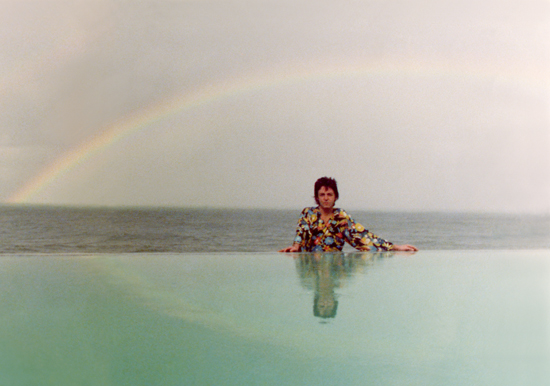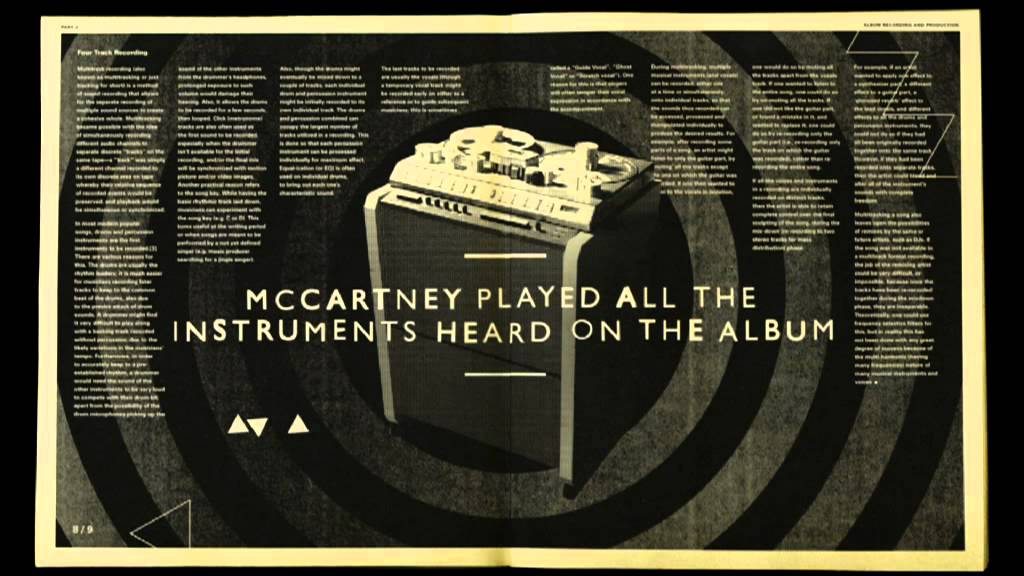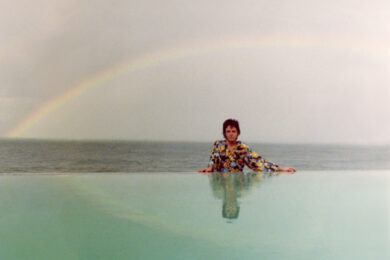Where can you go after the most globally adored, stratospherically successful, culturally significant pop group in history crumbles to dust around you? For Paul McCartney , not yet 30 and suddenly cut free from The Beatles, the answer was to strip everything back to basics, knock some ramshackle tunes together and play every instrument himself. The result was his first solo album, McCartney, released in 1970. Then history repeated itself a decade later, when Macca recorded his second one-man-band album McCartney II just as his post-Beatles project Wings was dying.
McCartney and II are the latest releases in McCartney’s ongoing series of expanded, remastered archive re-issues. Recorded just as the Fabs were unravelling into acrimony after Let It Be, McCartney is a lo-fi sketchbook of summery strums, bluesy jams and sunny reggae rhythms. It still has an unpolished charm, but lacks the forward-thinking cult appeal of McCartney II. The fertile musical hinterland that spawned Macca’s second one-man-band solo album was the shiny new era of affordable synthesizers, drum machines and home studios. Disco, New Wave and electronica were the new pop future, which explains why McCartney sounds on this album like he has been refreshed and revitalised by Talking Heads, Kraftwerk and Giorgio Moroder.
David Byrne certainly seems to inform the angular art-funk single ‘Coming Up’, with its shrill modernist squawks and memorable video featuring multiple McCartneys doing karaoke impersonations including Russell Mael of Sparks, Hank Marvin and his own Beatles-era self. Surreal. But the guts of the album contain much bolder experiments, notably the pristine synth-pop curiosity ‘Temporary Secretary’, a whooshing sequencer melody wrapped around a vaguely pervy boss-worker lyric. Dismissed as faddish novelty or ignored altogether by many reviewers in 1980, this former low-key 12-inch release has recently earned a serious cult following as a futuristic milestone in early British electronica.
Elsewhere on the album, McCartney cannot resist succumbing to his sweet-toothed populist impulses with the big syrupy piano ballad ‘Waterfalls’ – but much of McCartney II is an alluringly weird mash-up of trip-hop, Krautrock and synth-pop. Especially notable are the heavily electronic instrumentals ‘Front Parlour’ and ‘Frozen Jap’, their programmed beats overlaid with avant-muzak bleeps and squelches. The latter even opens with a crystalline keyboard motif that seems to predict Kraftwerk’s immortal ‘Computer Love’, released a year later.
The album’s extra disc of B-sides and extraneous material push the parameters even further, from the deluxe disco-funk symphony ‘Blue Sway’ to the chipmunk-voiced techno-dub shuffle ‘Check My Machine’, which laid down the blueprint for Gorillaz 20 years before Damon Albarn. Meanwhile, ‘Bogey Wobble’ and ‘Secret Friend’ offer further forays into vivid, dreamy, Eno-esque electronica. Squint a little and these wibble-wobble soundscapes could almost be the work of contemporary Warp signings.
McCartney II is not some flawless lost classic, but it does contain some of the most beautifully alien experiments in the ex-Beatle’s four-decade solo canon. It also highlights his underrated shadow career as a techno-curious avant-pop boffin, which stretches from the trippy tape-loop collages of ‘Tomorrow Never Knows’ to more recent electronic collaborations like The Fireman and Twin Freaks. Even if you don’t buy into the dense weight of mythology around the Beatles – in fact, especially if you don’t – McCartney II still stands up as a fascinating art-rock landmark.
What do you recall about making the McCartney album? It was recorded the same time as Let It Be, right?
Paul McCartney: No it was right after the Beatles had broken up, we’d finished recording. I’d been writing a couple of songs towards the end of the Beatles sessions and we tried out one called ‘Teddy Boy’ – I think that got onto Anthology or something. We’d kicked it around, but we hadn’t got it together enough to actually record it. It was a kind of contender, yeah. So after that I just had this choice – like, do I immediately get another band? Do I take six months off from music? Or do I just do what I do and make some music at home, that kind of thing. So I ended up doing that – I didn’t think I was making an album, I think that’s why some of the things are not aimed at anyone or anything. They are just me having fun.
The album has a sketchbook feel, like you were basically making it for yourself.
PM: Yeah, the guy from The Times at the time, the music critic was called William Mann. He gave it a good review, he said it was like ‘red hot coals’ or something. I never quite got it but I think it’s what you’re saying – a sketchbook.
It also sounds to me like somebody liberated from the huge pressures of being a rock superstar, like you are no longer bound by the high musical expectations of the Beatles.
PM: That was something to do with it, yeah. Like you say, it was the pressures of the Beatles, and also life in the goldfish bowl where you didn’t buy your own Christmas tree. Someone in the office bought your Christmas tree for you, and I just got fed up with that. So when Linda and I got together I was like: you know what? I can hop down the High Street and get my own Christmas tree, or even take an axe to the forest and hope nobody sees me.
There is a much stronger reggae influence on your solo career than on the Beatles songbook. Were you the main reggae fan in the band?
PM: I wouldn’t have thought that, I actually never thought that until now. But I did like it, I had the Tighten Up albums and used to play them a lot. And I used to go to Jamaica on holiday with the family. We had some great times there actually, so I was very into reggae.
McCartney II is much more of a cult favourite. Did you set out to make an avant-garde electronic album?
PM: I really just was fascinated with these things called synthesizers which had appeared on the scene – particularly with sequencers, I loved them. It was new technology and I just wanted to see what it was all about, and have a go, and see what I could do with it. Because the nice thing for me is, you do an album like that and it informs other stuff. It keeps your brain fresh so that when you go and do something else, a tour or something, you may not be playing that stuff but you’ve got the feeling of being someone who’s not finished yet. I’m still experimenting, you know?
You had dabbled in electronics and musique concrete in the Beatles, of course…
PM: Yeah, I did a load of things like that. The tape loops on ‘Tomorrow Never Knows’, that was a period when I was doing the Beatles stuff as the kind of day job and then in between I’d make little tape loop symphonies and stuff. God knows where they are, by the way – they ended up somewhere. And I once went to see the lady, Virginia Ironside or something, at the Radiophonic Workshop…?
Delia Derbyshire?
PM: That’s it! Nothing like Virginia Ironside at all, she’s a journalist or something! Ha! Yeah, I remember going down there, I had this idea to do a version of ‘Yesterday’ with her doing an electronic backing track to it… so yeah, I’m fascinated by that stuff. So when sequencers came along I was like: oh yeah, I’ll have a go at that. And you’re right, I did hear a few years ago that some DJ had picked it up in Brighton and was playing ‘Temporary Secretary’. And also, the thing of making music in your bedroom, or your living room, at home – that has now become the present whereas then it was the future.
‘Temporary Secretary’ is now something of a cult techno-pop classic. Did you know it was something special when you made it?
PM: I just saw it as an experiment, but I liked it. I thought the sequence was really nice and I though the idea was OK. But no, I didn’t know I was doing anything innovative really.
‘Check My Machine’ is another original oddity, it sounds uncannily like Gorillaz to me. In fact, I’m surprised Damon has never suggested a collaboration…
PM: We have kind of talked. Nothing serious, but I like what they do. I have run into Damon at things and we have talked. It’s got near a couple of times but we never had the time, I suppose…
Parts of McCartney II remind me of Talking Heads, Sparks, and the whole post-punk disco boom. Were you fans of the New Wave bands?
PM: Certainly Talking Heads. Sparks? Not so much. I’d just seen them on telly and probably the main reason I noticed them is they famously said guitars are finished. I was like: not entirely sure about that, lads. Ha! I know what you mean but maybe you shouldn’t have said that.
I also hear echoes of Kraftwerk and Krautrock on the album. Were you consciously picking up on those influences?
PM: I don’t think so really. There wasn’t anything on that album directly influenced. I do have a spongelike ear or mentality or whatever you call it, but it’s probably a bit subconscious. It was more a question of I knew who Kraftwerk were, but I didn’t have their records. I would just hear it and see it and read about it, so I kind of knew what they were doing. And I knew obviously that this equipment, this new technology had arrived. But rather than me emulating anyone, it was more a question of me seeing what I could do with it. And again, not necessarily thinking I was making an album, just to have some time to experiment. These days I would day that with The Fireman project. So I’ve always been into that – if you go from ‘Tomorrow Never Knows’ through McCartney I, McCartney II, The Fireman…
Likewise your Twin Freaks and Liverpool Sound Collage projects…
PM: Yeah. I love an opportunity where I can work on something like that. With the Liverpool Sound Collage, Peter Blake just said to me he was doing this collage exhibition and he wanted some music. So I thought: great, I’ll do enough for him to put it on a loop. So the guy who opened the doors at the exhibition, his first little job was to switch the tape on and when he went home at night he just turned it off. It just sort of played endlessly all day on a long loop. And wherever you walked in you would see this collage or that collage, to this bit of the soundtrack – it was just random.
Of course, there is also big soppy ballad on McCartney II, ‘Waterfalls’. You are basically an incurable romantic, right?
PM: That’s probably true, and what’s wrong with that? The nice thing is, I own up to it. I think a lot of people, particularly when you’re younger, don’t think it’s cool. They don’t understand how you can talk about that in your lyrics instead of making the world a little colder by being cool. I’m very aware of that, but that’s just my family background – we don’t care about that, if you fancy doing something romantic you just do it. The nice thing is, a lot of the people who gave me a hard time about it then grew up, they got married, had kids and then saw where I was coming from. I remember Bruce Springsteen at one of the Rock and Roll Hall of Fame things saying to me ‘Silly Love Songs, man! I really didn’t get it when you put that out – but I get it now! I’ve got kids!’ I think that can happen, but it’s a dangerous tightrope to walk.
I suspect the sweet-toothed ballads are a key reason why critics undervalue left-field experiments like McCartney II. You were always seen as the lightweight, palatable, family-friendly entertainer whereas John Lennon was the difficult, dark, raw artist. It became a lazy caricature: good cop, bad cop.
PM: Yeah, that did happen a lot. I kind of put that right in Barry Miles’ book, Many Years From Now. I don’t know what it is, maybe being Gemini, but I definitely have different sides to my character. So I can love Nat King Cole singing a ballad, and I can want to do that kind of thing myself, and then the next day I can wake up and I want to do ‘Check My Machine’. I’m not a one pocket guy, I have loads of interests – and that does get you in trouble. People say, ‘How dare you step outside your box!’Well I’m really sorry about it but I’m actually doing what I want with my life. I do sometime think I could just shut up and rest on my laurels and say: you know what guys, I’ll operate out of the pocket you put me in…. but no way! No way I’m gonna do that! I’d just get bored stiff the first minute.
You know the best way to confound your critics? You should make a death metal album next…
PM: Well, watch out. Watch this space.
The reissues of McCartney and McCartney II are out now. Check the Quietus later in the week for Paul McCartney interviewed by contemporary artists including Chris Carter, Gruff Rhys and Alexis Taylor




